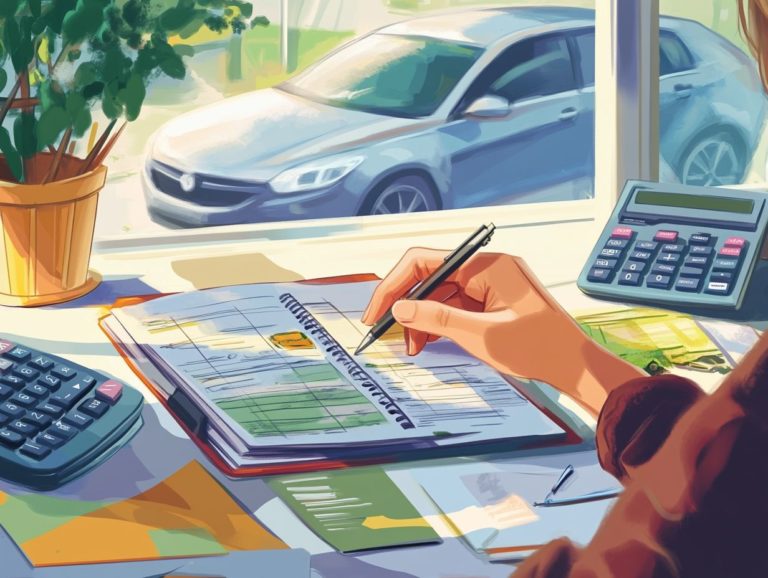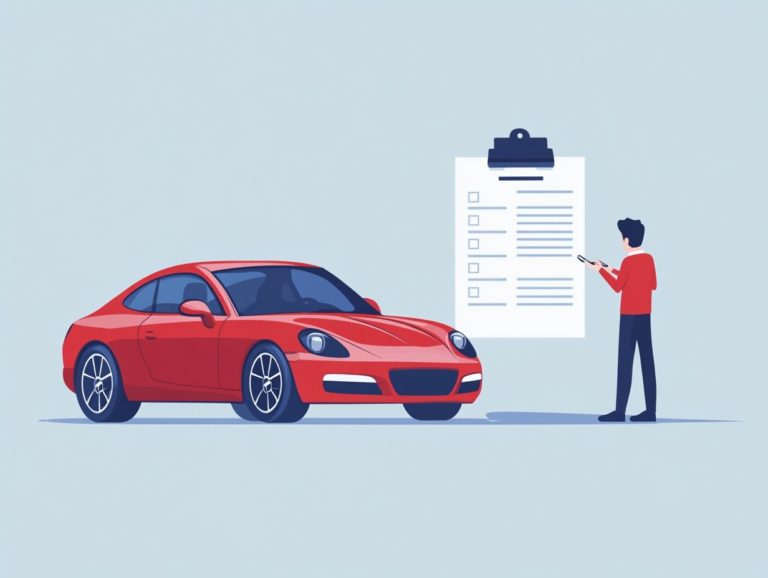Best Practices for New Car Maintenance
Proper maintenance is crucial for ensuring your vehicle runs smoothly and enjoys a long lifespan.
Regular maintenance tasks, from oil changes to tire rotations, are essential for keeping your car in optimal condition. You will learn about common mistakes to avoid that can save you money on repairs. You ll also find seasonal tips for preparing your vehicle for various weather conditions, along with advice on when to handle maintenance yourself or when it s best to seek professional help.
Dive in to unlock the secrets of keeping your car in top shape!
Contents
- Key Takeaways:
- Regular Maintenance Tasks
- Seasonal Maintenance Tips
- DIY vs Professional Maintenance
- Common Mistakes to Avoid
- Frequently Asked Questions
- What are the best practices for new car maintenance?
- How often should I change the oil in my new car?
- Why is it important to follow the manufacturer’s recommended maintenance schedule for my new car?
- Should I only take my new car to the dealership for maintenance?
- What are the benefits of routine tire rotations and inspections for my new car?
- How can keeping my new car clean impact its maintenance?
Key Takeaways:
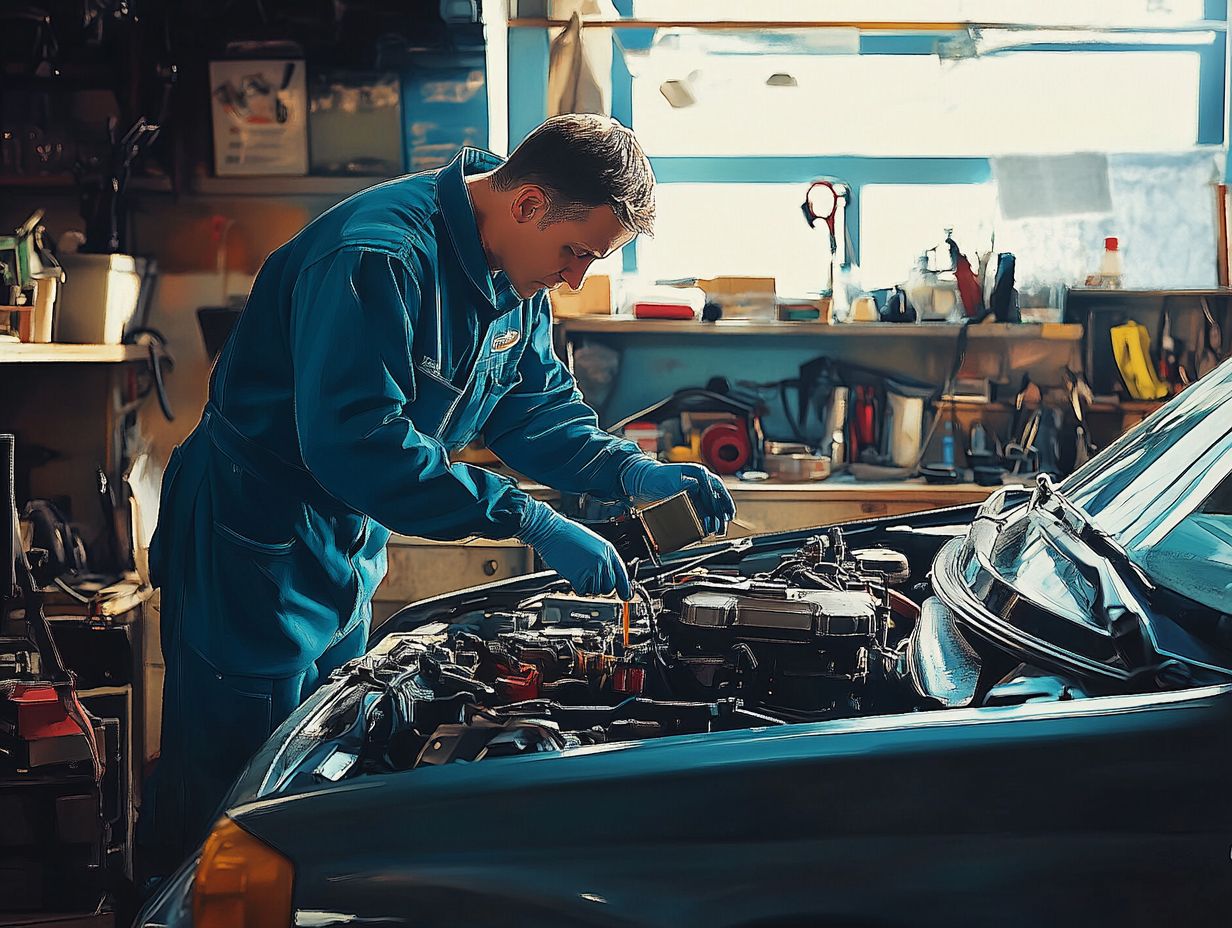
- Regular maintenance tasks, such as oil changes and tire rotations, are crucial for keeping your new car running smoothly and prolonging its lifespan.
- Don’t overlook seasonal maintenance, especially for preparing your car for harsh winter conditions and the summer heat.
- While DIY maintenance can save you money, it’s important to know when to seek professional help to avoid costly mistakes.
Why Proper Maintenance is Important
Proper maintenance of your car is essential not just for its longevity but also for the safety of you and your passengers. For those new to car care, following the top 10 car maintenance tips for beginners can make a significant difference.
By routinely checking coolant levels and changing the oil when necessary, you can significantly extend your car’s lifespan while boosting its fuel efficiency.
This proactive approach minimizes wear and tear and helps prevent serious issues that could arise if neglected. An effectively maintained vehicle is less likely to experience malfunctions, translating to a more reliable ride for you and your loved ones. Additionally, consider tips for customizing your new car to enhance your driving experience further.
Staying ahead of maintenance tasks like tire rotations and brake inspections ensures your car operates at its best, helping you avoid hefty expenses that come with emergency repairs.
Ultimately, the financial benefits of regular car maintenance align perfectly with an enhanced sense of safety and comfort on the road.
Regular Maintenance Tasks
Engaging in regular maintenance tasks is absolutely essential for ensuring your car runs smoothly and efficiently. This includes vital actions like changing the oil, checking the spare tire, keeping the battery clean, and preparing for new car ownership, which encompasses replacing brake pads among other important tasks.
Each of these tasks plays a crucial role in maintaining your vehicle s overall health. For instance, routine oil changes guarantee that the engine operates efficiently, while regular inspections of belts and hoses can help you avoid unexpected breakdowns.
By adopting a comprehensive maintenance schedule, including the best maintenance practices for SUVs, you can significantly elevate your vehicle’s performance and safety.
Oil Changes and Fluid Checks
Oil changes and fluid checks are among the most vital maintenance tasks for your vehicle, ensuring that the engine operates smoothly and efficiently.
Regularly changing your oil at the recommended intervals is essential; it prevents the buildup of harmful contaminants and extends the life of your engine while optimizing fuel efficiency.
Maintaining proper coolant levels is equally crucial for regulating engine temperature and preventing overheating. By checking these levels usually through the vehicle’s dipstick (a tool to check oil levels) or reservoir you can catch potential coolant leaks before they become problematic.
Additionally, inspecting belts and hoses for any signs of wear or cracks can help you avoid unforeseen breakdowns. Neglecting these critical tasks may lead to costly repairs due to engine malfunctions or overheating, underscoring the importance of regular car maintenance.
Tire Rotations and Inspections
Conducting regular tire rotations and inspections is essential for maximizing tire lifespan and ensuring safe driving conditions. This vital maintenance task involves repositioning each tire on your vehicle, promoting even wear across all tires. This ultimately enhances overall handling and performance.
When you neglect this crucial practice, you risk uneven tread wear. This can result in diminished traction and stability on various road surfaces. It’s equally important to check the spare tire for proper inflation and condition, as this could mean the difference between safety and complications during an emergency.
Periodically inspect your shocks for wear. Worn components can compromise ride quality and control. Overlooking these maintenance steps can significantly impact your vehicle s safety and efficiency.
Brake Inspections and Replacements
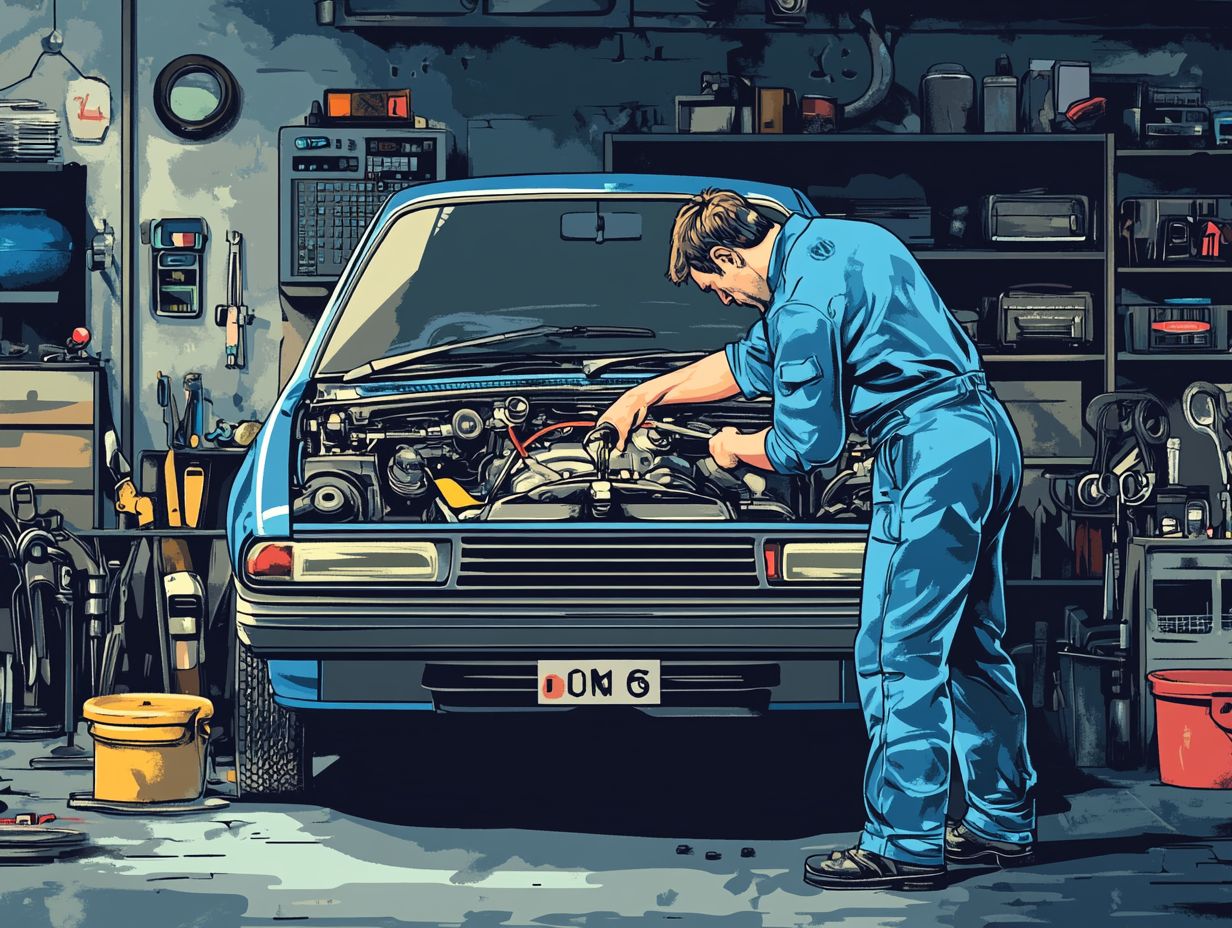
Regular brake inspections and timely replacements of brake pads keep you safe and confident on the road! This proactive approach not only keeps your braking system in peak condition but also enhances your overall driving confidence.
Be on the lookout for signs that it might be time for new brake pads, such as:
- A squealing noise when braking,
- A reduction in braking responsiveness, or
- A vibrating brake pedal.
Ignoring these signals can lead to larger repair costs and, more importantly, jeopardize your safety on the road. Routine inspections of headlights and emissions systems further support your vehicle’s health, preventing issues that could catch you off guard.
Stay aware of these components to significantly reduce the risks associated with brake failure and ensure a safer driving experience.
Seasonal Maintenance Tips
Seasonal maintenance tips are crucial for preparing your car for shifting weather conditions. For more detailed advice, check out these tips for efficient car maintenance budgeting, which ensure it performs at its best and keeps you safe all year round.
Preparing for Winter
Preparing your car for winter involves a series of essential maintenance tasks crucial for ensuring safe driving and optimal performance during those chilly months.
These checks enhance your vehicle’s reliability and empower you to navigate icy roads with confidence. One of the most important tasks is examining the battery’s health; cold temperatures can drastically reduce its efficiency. Consider adding antifreeze for your engine to keep your cooling system in top shape and prevent freeze-ups.
Don t overlook the importance of inspecting your wiper blades and tires. Good visibility and proper traction are critical when maneuvering through snow and slush. Prioritize these winter vehicle care tasks to avoid breakdowns and ensure a safe journey all season long.
Getting Ready for Summer
Getting your car ready for summer involves a series of essential maintenance checks to ensure it can handle the heat and operate at peak efficiency.
As temperatures rise, regularly check your coolant levels. Insufficient coolant can lead to engine overheating, which is the last thing you want. Inspect belts and hoses for any signs of wear, as these components significantly impact your vehicle s overall performance.
Ensure that your air conditioning system is functioning optimally. This enhances your comfort during sweltering days and helps prevent potential breakdowns.
Don’t neglect these vital maintenance tasks they can save you from costly repairs and breakdowns! Prioritizing these checks is essential for ensuring a smooth and enjoyable summer ride.
DIY vs Professional Maintenance
Understanding the balance between handling DIY maintenance tasks and seeking professional assistance is crucial for effective vehicle care and safety. Recognizing when to roll up your sleeves and when to call in the experts can make all the difference in maintaining your vehicle s performance and longevity.
When to Do It Yourself and When to Seek Professional Help
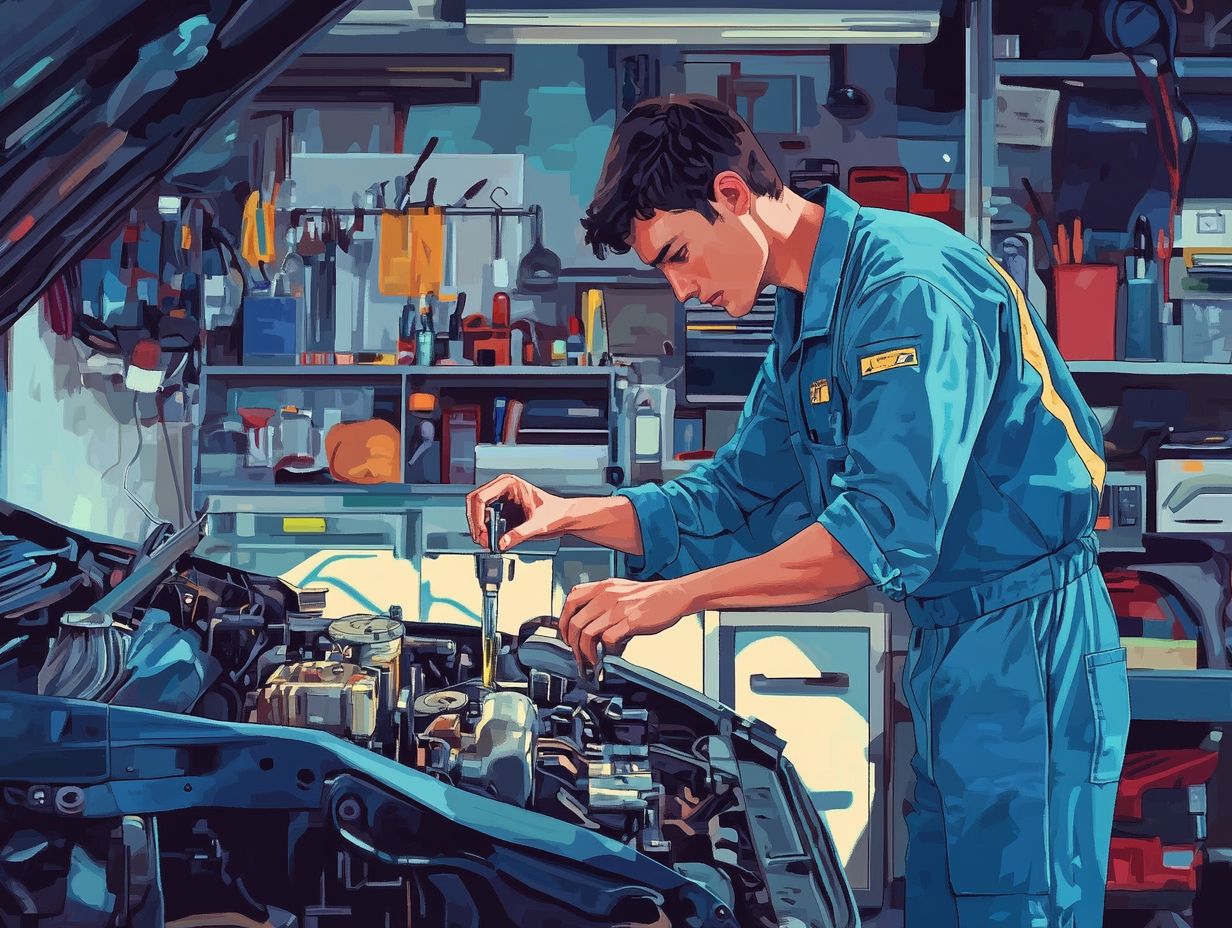
As a vehicle owner, it’s vital to grasp the distinction between straightforward maintenance tasks and those best left to experts. Simple tasks like changing the oil, checking tire pressure, or replacing air filters are often manageable at home with just a few basic tools. These efforts not only instill a sense of accomplishment but also deepen your familiarity with your vehicle.
For more complex tasks like major brake repairs or emissions inspections, seeking professional help is essential. This isn’t just about getting the job done right; it s also about following safety rules. By discerning which tasks are suitable for DIY, you can effectively maintain your vehicle while ensuring safety on the road.
Common Mistakes to Avoid
By steering clear of common mistakes and following the top 10 car maintenance tips for longevity, you can save yourself from expensive repairs and ensure your vehicle remains in peak condition.
Costly Errors to Watch Out For
Being aware of costly errors in vehicle maintenance can save you significant expenses and extend the lifespan of your car. Many owners often overlook crucial details, like sticking to oil change intervals, which can lead to unnecessary engine wear and tear.
Neglecting tire maintenance such as checking inflation and tread can compromise your safety and result in expensive replacements down the line. Don t ignore these minor issues! They can snowball into major and expensive repairs.
To address these oversights, establish a routine maintenance schedule, consult your owner’s manual, and seek professional inspections regularly. Following the essential maintenance checklist for new cars can help you take these proactive steps, allowing you to save money in the long run and ensure your vehicle operates at its best.
Frequently Asked Questions
What are the best practices for new car maintenance?
Some of the best practices for new car maintenance include:
- Regular oil changes
- Routine tire rotations and inspections
- Following the manufacturer’s recommended maintenance schedule
- Keeping the car clean and free of debris
How often should I change the oil in my new car?
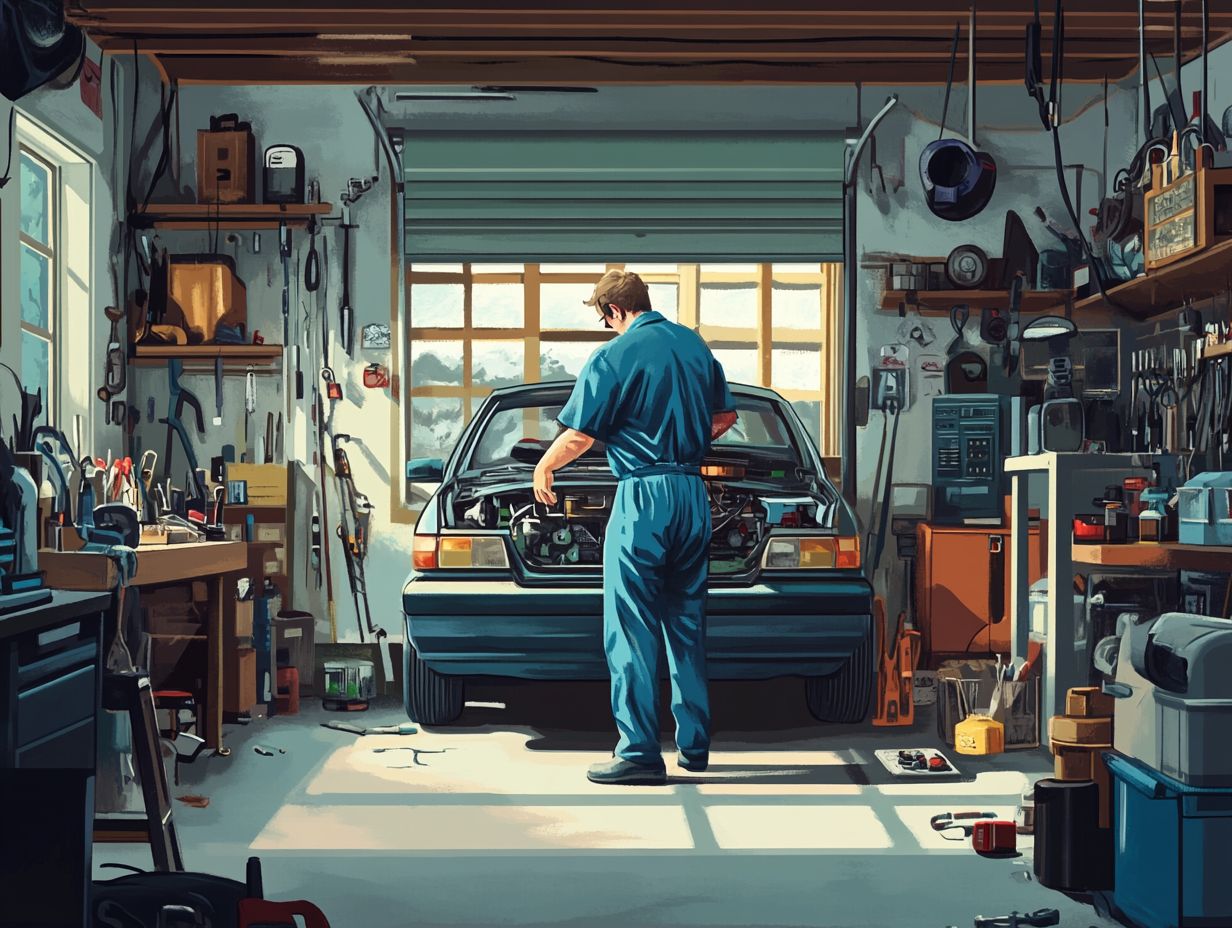
It is generally recommended to change the oil in your new car every 5,000 miles or every six months, whichever comes first. However, it’s important to consult your owner’s manual for the specific recommendations for your vehicle and be aware of common maintenance mistakes new car owners make.
Why is it important to follow the manufacturer’s recommended maintenance schedule for my new car?
The manufacturer’s recommended maintenance schedule is designed to keep your car running smoothly and prevent any potential issues. Ignoring this schedule could cost you big time!
Should I only take my new car to the dealership for maintenance?
While dealerships may have specialized knowledge and equipment for your specific make and model, it is not necessary to only take your car there for maintenance. As long as the mechanic is reputable and uses quality parts, you can take your car to an independent shop for maintenance as well.
What are the benefits of routine tire rotations and inspections for my new car?
Routine tire rotations and inspections help to ensure that your tires wear evenly and prolong their lifespan. They also allow for early detection of potential issues, such as uneven wear or tire damage, which can prevent more costly repairs in the future.
How can keeping my new car clean impact its maintenance?
Keeping your new car clean both inside and out can help to maintain its value and prevent potential damage. Regularly washing and waxing the exterior can protect the paint and prevent rust, while cleaning the interior can prevent wear and tear on surfaces and keep the car smelling fresh. For more tips, check out best practices for car maintenance.
Ready to schedule a maintenance check? Consult your owner’s manual today!




